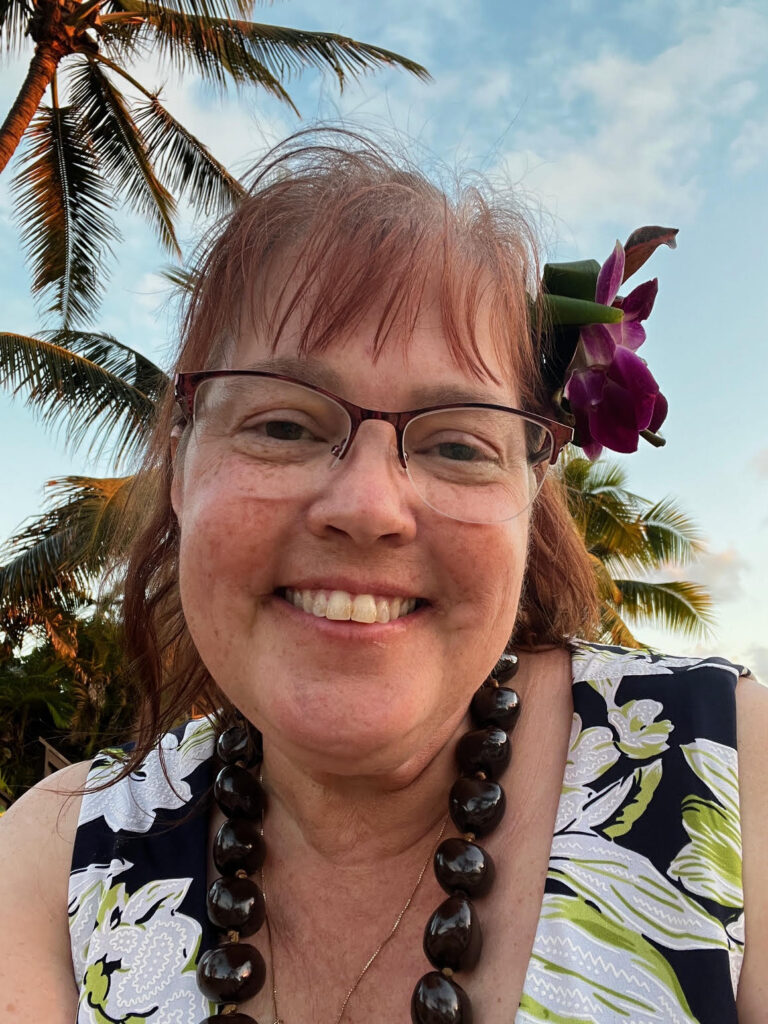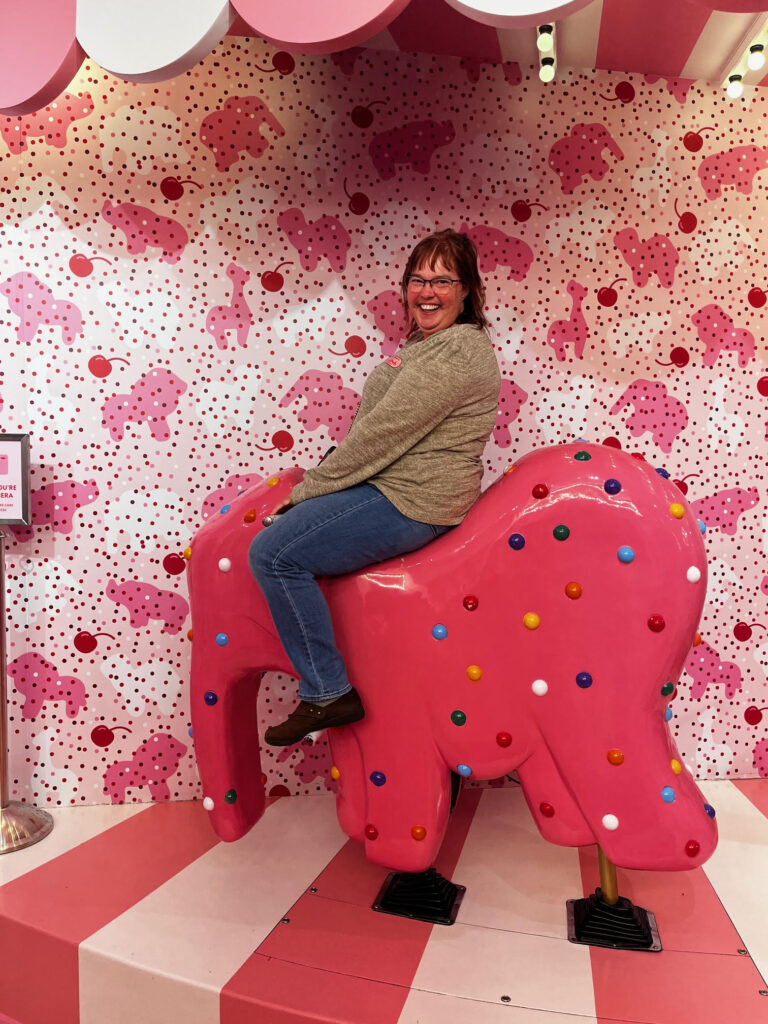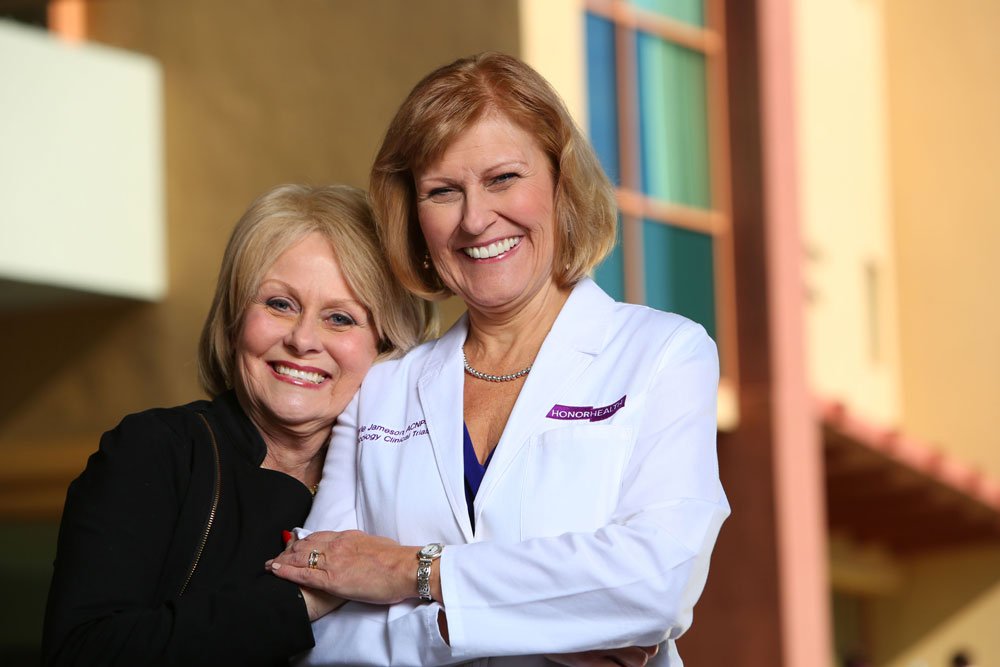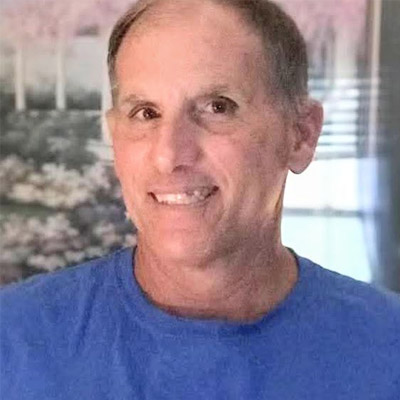April Gifford
Julia Brabant, April 2025EDITOR’S NOTE
We regretfully announce that April Gifford recently lost her battle to pancreatic cancer. She fought a courageous and valiant battle. April will be forever missed.
Below is her Warrior Story:

Getting cancer has never been about me. If it was just me, I wouldn’t have had chemo; I would have let it run its course. But I have a family, so I have to be responsible.
Life in rural Montana means easy access to wide open spaces and stunning natural scenery, but it can also create challenges for those needing regular, state-of-the-art medical care. While long wait times for appointments, lengthy travel distances and limited local resources made managing care more difficult for April Gifford, she, her husband, Bob, and their four children (two adult, one in college and one in high school) learned to navigate these hardships with grace and resolve. Through it all, they made sure nothing would stand in the way of the family making every moment count ahead of April’s passing in March 2025.
April first made the decision to seek medical treatment in the summer of 2021, after repeatedly experiencing pain in the center of her abdomen about a half hour after she’d eaten. At the time, she was working a desk job and trying to lose weight, but when she dropped about 50 pounds without putting too much effort into the process, she knew something was amiss.
April’s husband, Bob, whose mother passed away from colon cancer at age 49 (the same age April was at the time), urged April to schedule a colonoscopy. However, because she lived in such a remote part of Montana, and because the health care system was still strained due to the ongoing COVID-19 pandemic, about eight months passed before she could have the procedure.

Under the circumstances, I’m pretty blessed.
The colonoscopy didn’t indicate any major issues, but the doctor offered a CT scan to be on the safe side. Another three weeks passed before she had the scan, and she was out to dinner with her husband when the doctor called with the results.
The doctor delivered the news that April’s scans showed adenocarcinoma. Yet, having not had any family history of cancer, she was unsure of what that meant. Bob, however, knew all too well what it meant from his experiences with his mother.
“That’s cancer, honey,” he’d told April.
The head of the medical department called April soon after, referring her to oncology and recommending she begin chemotherapy. April wasted no time trying to schedule the meeting with oncology, but when she called to arrange a biopsy, she learned there was a three-month wait at the nearest hospital.
As luck would have it, April’s sister-in-law worked at a hospital in Seattle and was able to arrange an appointment for April within days, rather than months. There, April had a biopsy, and she also met with a general oncologist who told her she wasn’t a candidate for surgery because her tumor was too close to surrounding veins and tissue. April’s doctors had staged her cancer as “locally advanced, with vascular involvement.”
The oncologist encouraged her to “get her affairs in order,” recommending she take Oxycodone pills for her pain. April struggled to take pills, though, and had some reservations about taking the heavy painkillers. The doctor wound up prescribing pain medicine in liquid, rather than pill, form, and while he didn’t think April needed to see anyone else at the facility, April and Bob felt otherwise and asked if they could see a surgical oncologist.
The surgeon agreed that April should begin chemo, so she had a port installed. At this point, April decided it was time to tell her four children about her diagnosis, so she began the process of doing so, telling them in person, rather than over the phone, when possible.
After breaking the news to her kids, April began chemotherapy in Montana. She completed 10 rounds using FOLFIRINOX, a combination of chemo drugs, before doctors recommended removing oxaliplatin from the lineup. After 52 more rounds, she switched her chemo regimen yet again, adding the Oxaliplatin back while removing the Irinotecan.
April immediately reached out to the Mayo Clinic for another opinion. In June 2022, she met with a surgeon at Mayo who offered a surgical option after confirmation that there was no further metastasis. There was a suspect spot in her lung and in a lymph node in her neck on the June 2022 scans. A biopsy of the lung was inconclusive, but in September 2022, the lymph node biopsy was positive for cancer. The doctor said April was Stage 4 due to the metastasis and that surgery was now off the table. April visited the Mayo Clinic about every six months to get higher-quality CT and MRI scans and explore possible clinical trial opportunities.
In November 2023, April began experiencing additional health issues, and she returned to the major cancer center, where doctors determined she had cysts and neoplasms within her ovaries. She had her appendix removed and a full hysterectomy, after which doctors determined her ovaries had been “inundated with cancer.” While April’s surgical team removed the cysts laparoscopically, a leak occurred, spreading the cancer to the peritoneum.
This prompted another procedure known as laparoscopic HIPEC, or heated chemotherapy. While the procedure paralleled one used in a clinical trial, April, personally, was not part of the trial. She did, however, undergo radiation after the procedure to help remove any remaining cancer cells.
By October 2024, it appeared that chemotherapy was no longer effective. April’s oncologist at Mayo told her about a clinical trial that would likely open soon and said she’d be a perfect candidate for it. However, the trial stipulated that participants could only follow one chemo protocol. Looking at the trial and the secondary chemo option, April decided to remain on her current regimen and wait for the trial to open. However, subsequent scans in December 2024 confirmed that the chemo was ineffective, so April stopped undergoing chemo and waited for the clinical trial.
While April was able to regain some strength and spend time with her loved ones over the following months, additional health concerns arose in early 2025. She began developing ascites, or build-ups of fluid in her abdomen. She also began experiencing cognitive issues she didn’t have prior. Unfortunately, the trial did not open until one week prior to her passing, and the complications of the cancer prevented her from joining it. Sadly, after an almost-three-year fight, April passed away March 15, 2025, at the age of 52.

I don’t care about things like I used to, I used to care a lot about how I looked; how people treated me – now, it really doesn’t matter.
“I handle chemo really well,” April had said, noting that while she had some minor neuropathy during treatment, she largely avoided many other common chemotherapy side effects. “Under the circumstances, I’m pretty blessed,” she’d said.
April also did her best to maintain all aspects of her health and wellness, taking Vitamins B6, B12, C and D along with a turmeric extract and two types of mushroom extracts. She also took fish oil and iron supplements, MiraLAX to aid in digestion and glutamine to minimize neuropathy.
She also worked to adjust to the various lifestyle changes that often accompany a pancreatic cancer diagnosis and treatment plan. Her appetite wasn’t what it once was, so she’d set reminders when it was time to eat. She also purchased portion plates, which have clear markings on them indicating how much food to eat at each sitting.
April also found that her perspective on life shifted in the almost three years following her diagnosis.
“I don’t care about things like I used to,” she’d said. “I used to care a lot about how I looked; how people treated me – now, it really doesn’t matter.”
Rather than worry about the perceptions of others, April instead shifted her focus to her children.
“I don’t let things bother me like they did. I wear sweats in public,” she joked. “I think about things like, ‘How can I use this instance to teach my children?’ I try to teach them strength and how to accept something they can’t change.”
While teaching her children strength and resilience was a big part of April’s life, she also had some words of wisdom for anyone finding themselves in the same situation she did in the spring of 2022.
“Always get a second opinion, especially if all a doctor recommends is the ‘standard of care,’” she’d said. “New doctors aren’t always familiar with pancreatic cancer, so they just recommend the standard of care.”
Often, April pointed out, doctors recommend accepted practices because they simply lack the resources or knowledge they need to point patients in other directions. While living in such a rural community created undeniable challenges for April in terms of accessing timely medical care, she noted that the hospital in Billings has since hired a new oncologist who is passionate about clinical trials, and that he shared information about new and emerging ones with April regularly.
While waiting to see if a clinical trial emerged that she could potentially participate in, April didn’t sit idly by. Instead, she made time for what matters most, planning separate trips with all four adult children to destinations of their choice. For the first of these trips, April took her daughter to Oahu, Hawaii, where she wound up meeting with Roger Magowitz, the founder of the Seena Magowitz Foundation.
Over lunch, the two discussed clinical trials, with Roger putting April in contact with someone who conducted clinical trials so she could research them further. In the months leading up to her passing, April also made time to celebrate special moments and milestones with her friends, family and loved ones, although she passed before reaching what would have been her 25th wedding anniversary with Bob in August.
“He’s been amazing,” she said, of Bob. “The day he saw my scan, he quit working. He was a cargo pilot, but he hasn’t flown in three years now.”
For April, fighting cancer was always a family affair.
“Getting cancer has never been about me,” April said prior to her passing in March 2025. “If it was just me, I wouldn’t have had chemo; I would have let it run its course. But I have a family, so I have to be responsible.”
For April, fighting pancreatic cancer wasn’t simply about survival – it was about finding joy in every moment and demonstrating that, even in the face of adversity and uncertainty, it was important to show up – for her family, for herself and for the life she refused to let cancer define.



